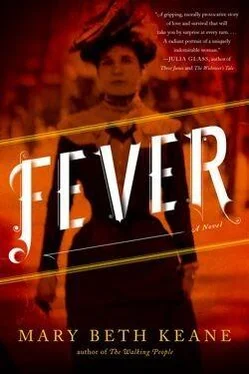She gave them no trouble. She listened and nodded and only once remembered her bag, still hanging on the hook at the hospital. When Dr. Soper gave her his hand to step down into the boat that would ferry them across Hell Gate, she placed her hand in his and then took her seat. In the series of questions there were one or two about Alfred, and Mary said only that he was deceased, not that he’d died the day before, or that there was a burial to arrange, or that it was still so new that she didn’t know what to make of it except that now that she was back on North Brother, at an actual, physical distance away from him, from their rooms, from their life, she seemed to be able to see it better — like backing away from a picture to take in the whole scene and not just the image at the center.
Her bungalow had not been occupied in the five years since she last saw it, and they were kind enough to air it for half a morning while she answered the doctors’ questions in the main hospital. It wasn’t like the first time around, where she fought and argued, and the tenor of their questions changed accordingly. Now she gave them the answers they sought right away, and they seemed grateful to her. She’d been asked to check in, and she hadn’t. She’d been asked not to cook, and she did. She knew the terms of her release and she violated them with full knowledge. She nodded. She wondered if her egret was still living on the island somewhere, if John Cane was still commuting daily. “You put lives at risk,” one of the doctors informed her, and she saw that they worried about getting through to her, that she mightn’t understand why they’d taken her again. “Before, it was carelessness. This time, it’s criminal.”
“I know that,” she said, and when she said it she realized she wasn’t just being agreeable; she did know. And that it had been a risk worth taking was something they would never be able to understand.
“And using a false name is an admission of guilt. Do you agree?” Mary nodded that she did, but again, there were so many things that were difficult to explain, things she didn’t even understand herself. It was possible to live in such a way as to keep one’s back to the things that were not convenient. People got Typhoid Fever when she cooked for them, and in some cases, those people died. But more often than not they did not get sick, and she was a remarkable cook, and wasn’t it possible that those people were going to die anyway? If our lives are determined before we are born, then what could she have done about it? And if every person who is born will die, and if every person will rise again, and come together again, and if our time on earth is only a handful of seconds compared to the infinity of life after, then wasn’t her crime very small? No greater than the crime of the East River that drowned Alberto Borriello? She’d taken a risk, but living was itself a risk, and most people agreed it was a risk worth taking.
And then she thought of the Kirkenbauer boy, his limp arm cast around her neck, his hot cheek against hers, and she felt a dead weight on her chest. She would not argue for herself. She would not fight them. If they decided to put chains on her ankles and drop her into the river, she would not object.
But they didn’t want to throw her into the river. They simply wanted her to stay on North Brother, and as soon as she opened the door of her bungalow and leaned against the range to look about the room, she realized that finding herself back on North Brother was surprising only in that it wasn’t entirely unpleasant. The ten-foot-by-twelve-foot room was so familiar to her, every fold in the dusty curtain, every creak in the floor, that within a few seconds she was astonished to think that just a short time ago she’d never expected to see it again. Every part of life feels strange, and every part of life feels inevitable. The mattress on her cot was rotted through, so they brought her another. She slept peacefully the first night, and in the morning John Cane left a sweet bun and a cup of coffee outside her door. When she saw him later, she’d ask him to let the coroner know that something had come up, but to use the little money she’d put aside for rent to buy Alfred a new shirt and tie, and to put him in a decent casket. “Tell him to take Alfred to St. Raymond’s in the Bronx,” she’d tell John Cane, and if the coroner didn’t do any of this, if the coroner just took her money and buried Alfred in his undershirt in one of the city plots, she supposed she’d never know. She took one further step back: and if John Cane never went to the coroner, if he felt too tired to spend time tracking down a stranger about a man he’d never liked as a favor for a friend who hadn’t reached out to him in five years, she supposed she’d never know that, either.
She was not as special as she’d been the first time around. In five years they’d discovered more healthy carriers, though the rest of them were allowed to live out their lives with family, at home. The papers that had taken up her cause in 1909 got word of her story again, but now cast her as villain. Jealous of young women who could still have children, and driven insane by an abusive and drug-addicted companion, she’d purposely gotten work at the hospital to infect those new mothers and kill their babies, was how one newspaper put it. Twenty-five people had contracted Typhoid Fever at Sloane Maternity Hospital. Two people had died. Mary read the article, and then she read it again, and both times had to catch her breath. She read it for a third time and then she folded it, left it on her front step, and decided she wouldn’t read the paper again until her capture was no longer in the news.
John Cane came for a visit on her third day back, and though she felt him glancing sideways at her while she was looking away, he wouldn’t meet her eye. So she talked a while but then drifted into silence, and as they sat, shivering, on the front step of her hut she saw the old retired horse in the distance, wearing a tartan blanket and looking across the water. “I thought he’d be dead by now,” Mary said after a bit, and John Cane stood, clapped his hands, yelled at the horse to get on.
“Dead!” John Cane said as he clapped his hands a few more times to warm them, as he reached for his toes and the sky and back again. “He wouldn’t leave North Brother for all the fresh hay in the kingdom.” He looked at her, finally. “And I don’t blame him. Life can be good here.”
“Okay, John.” Mary said. “Okay.” And across the dark blue water, a whistle sounded and a dozen or so strangers took a step back on the platform as the train they waited for pulled in. Mary stayed on the step just long enough to watch John Cane walk up the path and through the main door of the hospital. And then she went inside.
The doctors have asked me to write something about my life and my time here, but they didn’t say to address it to anyone, just to write it in the manner of a diary. A diary is something the writer keeps private, but I get the idea they plan on reading this one day, maybe after I die. Just write it anyway you like, they say. They mustn’t expect me to be around much longer or else they wouldn’t have asked. I am almost sixty-nine years old and had a stroke in April. Walking is difficult but I can hold a pen and write, which is a blessing though it’s slow going. Sometimes the tea dribbles from the left side of my mouth and that’s embarrassing. It’s a funny thing but when I had the stroke I recovered up in the hospital for a while and they took care of me and I thought this is what it’s like to truly be ill and not just treated like an ill person when I am healthy. All that care and attention is far more welcome when it is needed and not pushed on me.
Читать дальше












